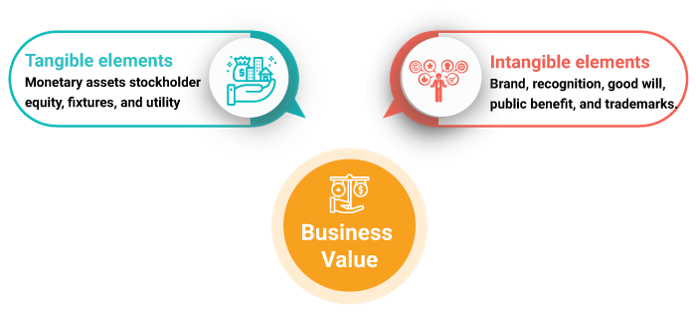What is Business Value and How It is Measured?

The well-being and health of a business are the estimation that is the business value. It constitutes all the aspects of the business that directly affect the valuation. Moreover, it encompasses the necessary shortcomings and issues that may have been hindering the progress of the business in a more efficient way.
Mục Lục
What is Business Value?
It is the standard value measure used in business valuation. PMBOK® defines business value as the entire value of the business; the total sum of all tangible and intangible elements. Examples of tangible elements include monetary assets, stockholder equity, fixtures, and utility. Examples of intangible elements include brand, recognition, goodwill, public benefit, and trademarks.

In simple terms, it simply covers both the monetary and non-monetary values of a firm. It can be manipulated by managing the current project efficiently. All organizations run business-related activities even if they aren’t business-driven like a government agency or a nonprofit organization.
The concept of business value is fairly subjective and it depends on the needs of the organization. For example, an investor aiming solely for financial benefits would be different from an entrepreneur aspiring for personal goals and development.

How to Measure Business Value?
The subjective and dynamic nature of business value may land you on the question that whether it can be measured or not and the answer is yes. The following factors can help you determine it for a particular organization:
-
Revenue
-
Profitability
-
Market share
-
Brand recognition
-
Customer loyalty
-
Customer retention
-
Share of wallet
-
Cross-selling ratio
-
Campaign response rate
-
Customer satisfaction
Must-Have Values
For a project to be able to deliver business value, it should ensure the following conditions:
-
It should have a clear objective.
-
The project should be aligned with the business goals.
-
It should have required stakeholder support.

Role of Portfolio, Project, and Program Management
Regardless of the nature of the business value, an effective portfolio, project, and program management are required to get the desired result.
Portfolio management aligns components (projects, programs, or operations) to the strategy of the organization to optimize project or program objectives, costs, dependencies, timelines, resources, benefits, and risks. This allows organizations to have an overall view of how the strategic goals are reflected in the portfolio, institute appropriate governance management, and authorize human, financial, or material resources to be allocated based on expected performance and benefits.
Program management enables organizations to align multiple projects for optimized or integrated costs, effort, schedule, and benefits. Program management emphasizes project interdependencies and determines the optimal approach for managing and accomplishing the desired benefits.
Project Management provides organizations with the ability to apply knowledge, skills, processes, tools, and techniques that enhance the possibility of success over a wide range of projects. Project Management concentrates on the effective delivery of products, services, or results.
?
Information Technology
As discussed earlier, business value is a subjective concept and it differs from person to person and department to department. Given below are some of the performance factors that constrain and somewhat determine IT capabilities in the field of information technology:
-
Usability
-
Security
-
Agility
-
Functionality
-
Availability
-
Reliability
-
Performance

Steps to Deliver Business Value
However, there is no defined or set pattern for the steps to be followed to deliver business value. But the basic blueprint is the same. The key is to understand the vision clearly and then illustrate it to the team members while also motivating and encouraging them towards the goal. Given below are the ideas of steps that a project manager should undertake to ensure that the project is capable of delivering:
-
Understand the Vision
-
Be clear about the business value of the project
-
Evangelize the vision and business value to the project team
-
Foster, a team environment to effectively deliver value
-
Measure the realization of the business value

Conclusion
While most organizations focus on core IT performance, business values are also equally important. Their benefits are not seen instantly but in the long run, they do make a big difference. It allows us to see the additional and intangible ways to improve the performance of your organization. Efficient portfolio, project, and program management help us to realize the predetermined goals and objectives of the organization. Give yourself a chance to evolve in your project management role with the PMP certification training and gain the best skills and practices in project management.
Know more about Project Management best practices through Invensis Learning’s Project Management certification training on PMP Certification Course Online, CAPM Certification Course Online, Prince2 Course, Project Management Fundamentals, etc.
Project Management Fundamentals
EXIN Business Analysis Foundation and Practitioner Training
PMP Certification
Change Management Foundation and Practiitioner Certification Training
PRINCE2 Foundation and Practitioner Certification Training
CAPM Exam Prep















![Toni Kroos là ai? [ sự thật về tiểu sử đầy đủ Toni Kroos ]](https://evbn.org/wp-content/uploads/New-Project-6635-1671934592.jpg)


